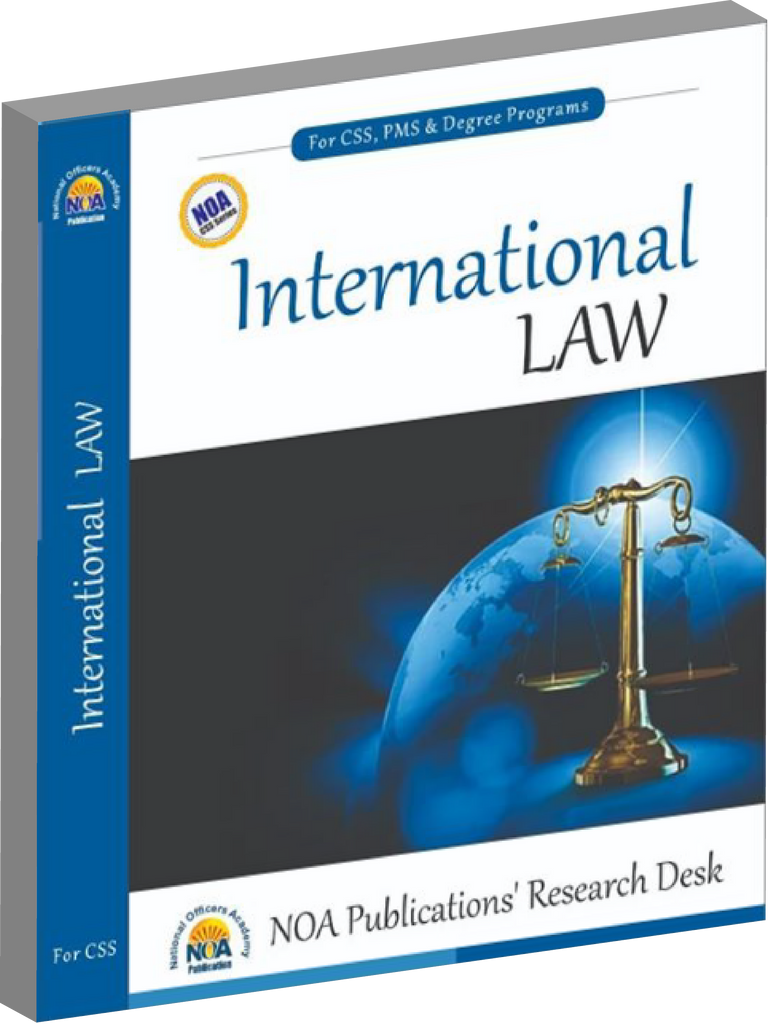International Law By Hafiz Mohsin Ali Khizer (NOA Publication)
(Best For Competitive Exams(CSS,PMS,PCS & All Descriptive Exams
PREFACE
International law is an important part of the structure of our international society. It adds that states accept it as such, and their record in observing it bears comparison with the level of law observance in many countries. It stresses that international law is a part of the structure for it is an integral part of it and not an optional extra; and that it is but one part in the overall equation important, but not to the exclusion of other parts. It explains that the importance of international law is a function of its effectiveness and its ability to respond to change. Both, at the present time and for the most part, are adequate, but perhaps only just. It adds that neither can be taken away for granted. It clarifies that both need attention and development within a framework of respect for the international rule of law, if a stable international order is to prevail. This rationale make this subject an important one for all CSS aspirants.
Realization of compilation of this book was made on the basis that all aspirants of CSS opting International Law as an optional subject were facing a dilemma of non-availability of such single book which cover all contents in a consistent manner. FPSC recommended books, although too good, are either not covering the syllabus or they become difficult to follow because most of the students have no background of the subject. Approach being followed in those books is either too advanced or not consistent with the expectations of the examiner. On the other hand, books by local publishers are not up-to-the-mark and in most of the cases, compiled from some non-standard references. This effort is made in order to make the subject easy and provide a one-book solution to all aspirants consistent with the requirements of the exam and diversity of the subject.
We are thankful to all those who, directly or indirectly, contributed by sharing their valuable ideas and suggestions regarding book preparation. Our special thanks. are extended to our parents, teachers, colleagues and family. We are also thankful to those who appreciated this effort and encouraged a lot during this exercise. We are thankful to Mr. Bilal Khan, faculty member of International Law in NOA, for his continuous assistance and directions in compilation of this book. Lastly, we are thankful to Dr. Muhammad Atif (CEO, National Officers Academy) for his non-relinquishing patronage of our team. Without his commitment towards the cause, it was not possible for us to move even a single step.
We wish and pray that this book enlighten the students with the best knowledge gathered at one place. Fruitful suggestions to improve the contents will be highly appreciated.
Hafiz Mohsin Ali Khizer
Lead Author
SYLLABUS
· Nature, Origin and Basis of International Law.
ü The Emergence of International Law, Early European Authors, The Nation-State System, The Enforcement of International Law, The Effectiveness of International Law, The Weakness of International Law, The Juridical Basis of International law, The Future of International law and Material Sources of International Law.
· Relation between International Law and State Law.
ü Article 38 of the Statute of International Court of Justice, Primary Sources of International Law, Subsidiary Sources of International Law, International Soft Law
· State in General and Recognition
ü Personality and Statehood in International Law, The Subjects of International Law, Recognition of State and Government in International Law, Recognition of State and Government in National Law.
· The Law and Practice as to Treaties
ü The Vienna Convention on the Law of Treaties
· The Settlement of International Disputes.
ü Negotiation, Mediation and Good Offices, Inquiry, Settlement by the United Nations, Conciliation, Arbitration, The International Court of Justice.
· International Humanitarian Law.
ü International and Non-International Armed Conflicts, Non-International Armed Conflict, 'Combatant' and 'Protected Persons', Protection of Wounded, Sick and Ship-Wrecked Persons, POWs, Civilians, Limitations on the Conduct of War, Limits on the Choice of Methods and Means of Warfare.
· The Use of Force
ü The Law before the UN Charter, The Law after the Charter, The Collective Use of Force, The Right of Self-Defence.
· International Institutions
· State Territorial Sovereignty.
· State Responsibility.
· State Jurisdiction.
· Succession to Rights and Obligations.
· The State and the Individual.
· The State and the Economic Interest.
· Diplomatic Envoys, Counsels and other Representatives.
· War, Armed Conflicts and other Hostilities.
· Neutrality
CONTENTS
Syllabus
Nature, Origin and Basis of International Law
1) Definition of International Law
a. Definition by Oppenheim
b. Definition by Torstein Gill
c. Definition by J.L. Briley
d. Definition by Hackworth
e. Definition Derived from Various Judgments
f. Soviet Definition of International Law
g. Essential Criteria of a Good Definition
h. Final Definition
2) Traditional vs. Modern International Law
3) Private vs. Public International Law
a. Private International Law
b. Public International Law
c. Difference between Public and Private International Law
4) History of Origin and Emergence
a. Early Ages
b. Middle Ages and Renaissance
c. Modern Era
d. Conclusion
5) Functions and Objects of International Law
a. Cooperation among Actors
b. Identifies Membership of International Society
c. Mechanism to Regulate Interests of the Actors
d. Protection of Weaker Interest
e. Instrument to Promote Justice
f. Maintenance of Peace and Security
6) Nature of International Law
a. Debate of “Status of Law”
b. Debate of “Voluntary Compliance”
c. Debate of “Horizontal Authority System”
d. Energy Propelling International Law
e. Built into Order of International Relations
Nature, Origin and Basis of International Law
1) Definition of International Law
International Law consists of the rules and principles of general application dealing with the conduct of States and of international organizations in their international relations with one another and with private individuals, minority groups and transnational companies. As per archives of International Law Commission (ILC), 46 different definitions of international law have been proposed by different renowned jurists, legal judgments or legal schools. However, these definitions of International Law went through critical analysis and debate. Some of the key definitions are discussed below along their shortcomings:
a. Definition by Oppenheim
"Law of Nations or international law is the name for the body of customary law and conventional rules which are considered binding by civilized states in their intercourse with each other." Various shortcomings of this definition have been identified by scholars. These are:
ü Firstly, the use of word 'body' reflects that it is a bunch of some static rules and nothing new can be incorporated within this body. This neglects the diversity and dynamic nature of modern international law.
ü Secondly, this is limited to only civilized states. At first place, the meaning of 'civilized' varies from state to state. Additionally, modern international law is limited not only to states. It is applicable to international organizations, non-state actors and to some extent on individuals as well.
ü Thirdly, only customary laws and conventional rules are mentioned as sources of law. However, modern international law also incorporates general principles of law, jurists' work, legal judgments, etc. So, this definition also fails to discuss all sources of modern international law.
b. Definition by Torstein Gill
"Body of rules of law which apply within international community or society of states. Same criticism is equally applicable to this definition as well. It also compromises the dynamic nature of international law by using the word 'body'. Secondly, it also fails in identifying multiple sources of international law. However, one salient aspect of this definition is that incorporates the word 'international community' so, it is not limited only to 'state' as subject of international law rather than the whole international community which may include international organizations, non-state actors as well as individuals.
c. Definition by J. L. Briley
"It is the body of rules and principles of action which are binding upon the civilized states in their relation with one another." One strong feature of this definition is inclusion of 'body of rules' which can be customary rules or treaty rules as well as ‘ principles of action’ which can be all general principles of law. So, this definition is more comprehensive in terms of sources of law. However, use of word ‘body’ render the nature of law as static, Similarly, this definition also fails in addressing all subjects or objects of international law and in confined only to states.

